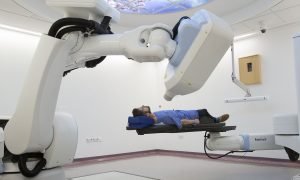Overview
Cushing syndrome is a rare but serious hormonal disorder caused by prolonged exposure to high levels of cortisol, a stress hormone produced by the adrenal glands. It can result from long-term use of corticosteroid medications or from the body overproducing cortisol due to tumors in the adrenal glands, pituitary gland, or elsewhere in the body. This condition is also referred to as hypercortisolism.
The effects of Cushing syndrome are varied and can affect multiple systems in the body. Common symptoms include rapid weight gain, particularly around the abdomen and face, leading to a characteristic “moon face” appearance. Other symptoms include thinning skin that bruises easily, purple stretch marks on the skin, muscle weakness, and fatigue. People with this disorder may also experience high blood pressure, osteoporosis, and psychological issues such as depression or mood swings. Women may notice irregular menstrual cycles, while men may have reduced libido or erectile dysfunction.
Treatment for Cushing syndrome depends on its underlying cause. If the condition is due to excessive corticosteroid use, a doctor may gradually taper the dosage to safer levels or prescribe alternative medications. For cases caused by tumors, surgery is often the preferred treatment, and it is frequently successful in normalizing cortisol levels. Radiation therapy or medication to control cortisol production may be recommended if surgery is not possible or fully effective. Lifestyle changes, such as adopting a healthy diet and engaging in regular exercise, can also support recovery and help manage symptoms.
When properly diagnosed and treated, the prognosis for Cushing syndrome is generally favorable, although recovery may take months or even years, depending on the severity of the condition. Early diagnosis and intervention are crucial to prevent long-term complications, such as heart disease or diabetes, and to improve the quality of life for those affected by this disorder.
Table of Contents
When to See a Doctor
If you suspect you may have Cushing syndrome, it is essential to consult a medical professional to ensure timely diagnosis and treatment. While some symptoms may appear mild at first, this condition can lead to serious complications if left untreated.
Signs to see a doctor:
- Unexplained weight gain and fat distribution. If you notice rapid weight gain, especially around your abdomen, face, or upper back, it’s important to get evaluated, as this is a hallmark sign of Cushing syndrome.
- Persistent high blood pressure. If your blood pressure remains elevated despite lifestyle changes or medications, it could be a symptom of excessive cortisol production.
- Severe skin changes. Easy bruising, purple stretch marks, or thinning skin that heals poorly may indicate an underlying hormonal imbalance.
- Muscle weakness and fatigue. If you experience significant loss of strength or constant tiredness that interferes with daily activities, it warrants a professional assessment.
- Frequent mood changes or mental health issues. Depression, anxiety, irritability, or mood swings that worsen over time could be linked to high cortisol levels and require evaluation.
- Irregular menstrual cycles or reduced libido. Hormonal disruptions like missed periods in women or sexual dysfunction in men may point to endocrine disorders, including Cushing syndrome.
- Worsening chronic conditions. If you have diabetes or osteoporosis that becomes increasingly difficult to manage, it could be related to cortisol dysregulation and should be checked by a doctor.
Seeking medical attention early is critical for preventing further complications associated with Cushing syndrome. A healthcare provider can perform the necessary tests, such as blood and urine cortisol levels, and create a treatment plan tailored to your condition. Early diagnosis improves the chances of successful treatment and recovery.
What Type of Doctor to Seek
When dealing with suspected Cushing syndrome, it is essential to consult a healthcare professional who specializes in hormonal disorders. The primary specialist to seek is an endocrinologist, a doctor trained to diagnose and treat conditions related to the endocrine system, including disorders of the adrenal and pituitary glands. An endocrinologist can perform comprehensive evaluations, such as blood tests, urine tests, and imaging studies, to confirm a diagnosis and determine the underlying cause of the excessive cortisol production.
In some cases, other specialists may also be involved in your care. If a tumor is suspected as the cause of Cushing syndrome, you may be referred to a neurosurgeon, if the tumor is located in the pituitary gland, or a general surgeon, if the tumor affects the adrenal glands or other areas. Additionally, a primary care physician or general practitioner often serves as the first point of contact and can provide referrals to the appropriate specialists. By consulting the right medical professionals, you can receive accurate diagnosis and effective treatment tailored to your specific needs.
What to Expect from Your Visit to a Doctor
During your visit to a doctor for suspected Cushing syndrome, the first step will typically involve a detailed discussion of your medical history and symptoms. The doctor will ask about changes in weight, energy levels, skin condition, and any other signs that may suggest hormonal imbalances. They may also inquire about medications you are taking, particularly corticosteroids, as these are a common cause of the condition. A physical examination will likely follow, focusing on signs such as unusual fat distribution, skin changes, and muscle weakness.
If Cushing syndrome is suspected, the doctor will recommend diagnostic tests to confirm the condition and identify its cause. These tests may include blood and urine tests to measure cortisol levels, a saliva test to assess nighttime cortisol production, or a dexamethasone suppression test to evaluate how your body responds to corticosteroid medication. Imaging studies, such as CT scans or MRIs, may also be ordered to detect tumors in the adrenal or pituitary glands. Based on the results, the doctor will create a personalized treatment plan and may refer you to an endocrinologist or surgeon if specialized care is required.
Cushing Syndrome Treatment Options

Treating Cushing syndrome requires a comprehensive approach that targets its root cause while managing symptoms to improve overall health. Depending on the type and severity of the condition, treatment options may include medication, surgery, radiation therapy, or lifestyle adjustments. These treatments often work together to achieve full recovery and reduce complications. Below is a detailed guide to the available treatments:
- Adjusting corticosteroid use and introducing alternative medications. For exogenous Cushing syndrome caused by prolonged corticosteroid use, doctors may gradually reduce the dosage or switch to alternative medications. Abruptly stopping corticosteroids can be dangerous, so adjustments must be supervised by a healthcare provider. Additionally, medications such as ketoconazole, metyrapone, or mitotane may be prescribed to suppress excess cortisol production. In some cases, mifepristone is used to block cortisol’s effects on tissues, though it is contraindicated in pregnant women. Another option is pasireotide, an injectable medication that reduces ACTH production and is often given twice daily.
- Surgical removal of tumors. For endogenous Cushing syndrome caused by adrenal, pituitary, or other tumors, surgery is often the primary treatment. A skilled surgeon removes the tumor to normalize cortisol levels. If the tumor cannot be fully removed, radiation therapy may be used alongside surgery to ensure better outcomes.
- Radiotherapy. Radiation therapy is a valuable option when surgery is not possible or fails to completely resolve the condition. Conventional radiation may require several weeks of treatment, while stereotactic radiosurgery delivers a single, precise dose of radiation to minimize damage to surrounding tissues.
- Bilateral adrenalectomy. In severe cases where other treatments fail, doctors may recommend the surgical removal of both adrenal glands. This procedure, called bilateral adrenalectomy, effectively halts cortisol overproduction. However, lifelong maintenance therapy with corticosteroids is necessary to replace the hormones the adrenal glands would normally produce.
- Dietary adjustments for Cushing syndrome. While diet alone cannot cure Cushing syndrome, it plays a critical role in managing symptoms and preventing complications.
- Limit sugary foods. To control elevated blood sugar levels, reduce intake of sweets and choose whole grains, non-starchy vegetables, and lean proteins instead.
- Reduce sodium. High cortisol levels can lead to hypertension, exacerbated by high sodium intake. Opt for low-sodium foods and season meals with natural spices like ginger, turmeric, or cinnamon instead of salt.
- Avoid alcohol. Alcohol consumption can increase cortisol levels and worsen health outcomes, making it crucial to limit or avoid drinking.
- Increase calcium and vitamin D. Cushing syndrome weakens bones, so include calcium-rich foods like broccoli, tofu, and dairy, and vitamin D sources such as fatty fish, egg yolks, and mushrooms. Regular sun exposure with sunscreen is also beneficial.
- Ensure adequate protein intake. To combat muscle loss caused by high cortisol levels, consume protein-rich foods such as beans, eggs, tofu, and lean meats.
These dietary recommendations are especially important during medication use or post-surgery recovery, as they support faster healing and enhance the effectiveness of treatment.
Cushing syndrome treatments often require a combination of interventions tailored to the individual’s specific condition. Following the prescribed therapies, maintaining open communication with healthcare providers, and adopting a healthy lifestyle can significantly improve recovery outcomes and reduce the risk of recurrence.
Cushing Syndrome Prognosis
 Image Source: www.dailymail.co.uk
Image Source: www.dailymail.co.uk
The prognosis for Cushing syndrome largely depends on the treatment option chosen and the underlying cause of the disorder. While some treatments offer a high chance of complete recovery, others require ongoing management to control symptoms and prevent complications. Here’s an overview of the expected outcomes for each treatment approach:
- Adjusting corticosteroid use and alternative medications. Gradual tapering of corticosteroids or switching to alternative drugs usually resolves symptoms of exogenous Cushing syndrome. For endogenous cases, medications to suppress cortisol production often reduce symptoms within weeks to months, though long-term use may involve side effects that need monitoring.
- Surgical removal of tumors. Surgery has a high success rate, especially for pituitary or adrenal tumors, with many patients experiencing a full recovery of normal hormone levels. Recovery may take time, and in some cases, hormone replacement therapy is needed temporarily or permanently.
- Radiotherapy. Radiation therapy is effective in reducing cortisol levels when surgery is incomplete or not possible. However, it may take months to years for full benefits to appear, and patients may require interim medication to manage symptoms.
- Bilateral adrenalectomy. While this surgery guarantees the cessation of cortisol overproduction, it necessitates lifelong corticosteroid replacement therapy. With proper management, patients can lead healthy lives, but there is a risk of adrenal insufficiency if hormone levels are not carefully monitored.
- Dietary adjustments. While diet alone does not cure Cushing syndrome, following a recommended nutritional plan can significantly improve quality of life, support recovery from other treatments, and prevent complications such as diabetes or osteoporosis.
With appropriate treatment, many individuals with Cushing syndrome achieve significant symptom relief and improved quality of life. Early diagnosis and a tailored treatment plan are essential for the best outcomes, and ongoing care ensures that complications are minimized or prevented altogether.


